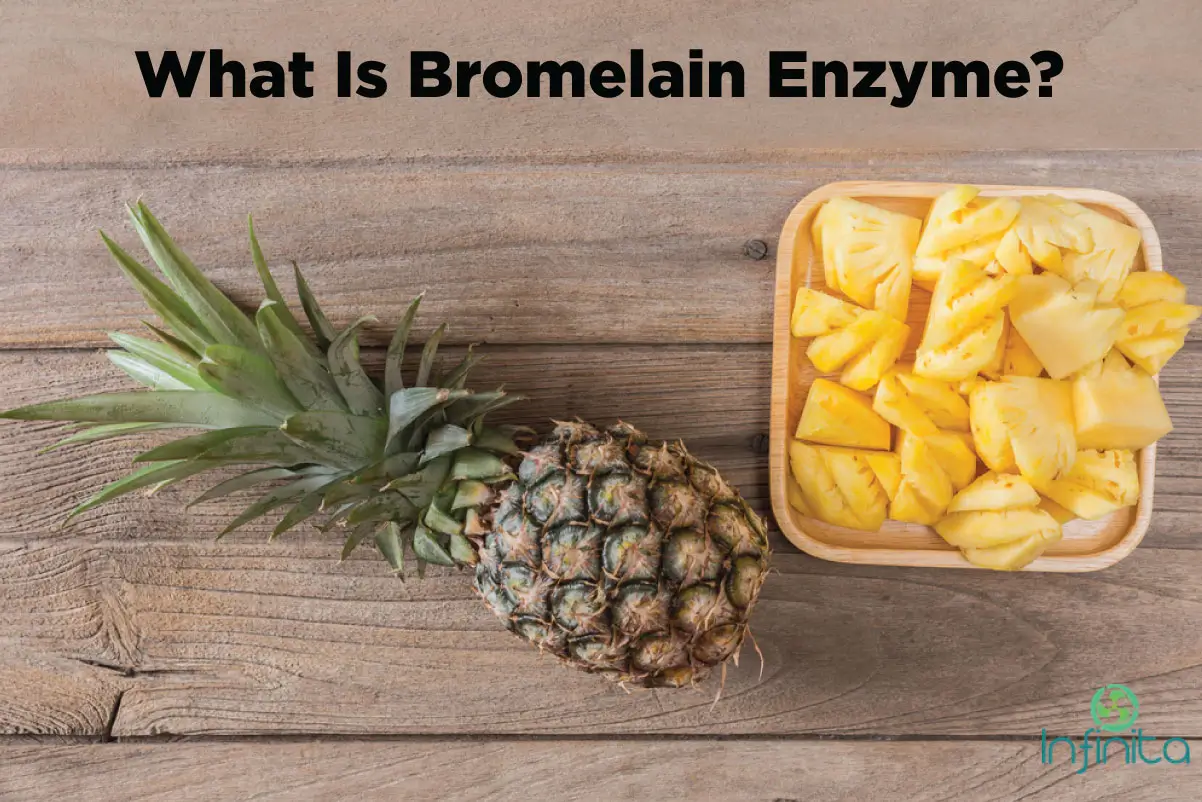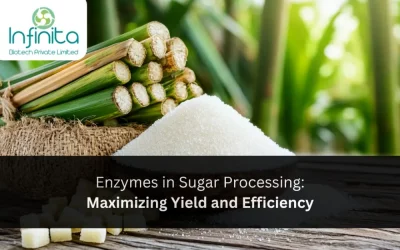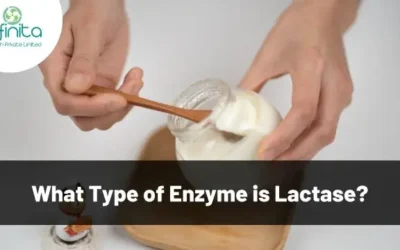What Is Bromelain Enzyme?
Bromelain is an enzyme extract derived from the stems of pineapples, although it exists in all parts of the fresh plant and fruit. The extract has a history of folk medicine use. As a culinary ingredient, it may be used as a meat tenderiser.
The term “bromelain” may refer to either of two protease enzymes extracted from the plants of the family Bromeliaceae, or it may refer to a combination of those enzymes along with other compounds produced in an extract. Although tested in a variety of folk medicine and research models for its possible efficacy against diseases, the only approved clinical application for bromelain was issued in 2012 by the European Medicines Agency for a topical medication called NexoBrid used to remove dead tissue in severe skin burns.
History of Bromelain Enzyme
Pineapples have a long tradition as a medicinal plant among the natives of South and Central America. The first isolation of bromelain was recorded by the Venezuelan chemist Vicente Marcano in 1891 by fermenting the fruit of the pineapple. In 1892, Russell Henry Chittenden, assisted by Elliott P. Joslin and Frank Sherman Meara, investigated the matter more completely, and called it ‘bromelain’. Later, the term ‘bromelain’ was introduced and originally applied to any protease from any member of the plant family Bromeliaceae.
Sources of Bromelain Enzyme
Bromelain is present in all parts of the pineapple plant (Ananas sp.), but the stem is the most common commercial source, presumably because usable quantities are readily extractable after the fruit has been harvested.
How Does It Work?
Bromelain seems to cause the body to produce substances that fight pain and swelling (inflammation).
Bromelain also contains chemicals that interfere with the growth of tumor cells and slow blood clotting.
Benefits of Bromelain Enzyme
People use bromelain as a natural remedy for many health issues. There is little quality scientific research to support many of its use, however. We discuss the possible benefits of bromelain supplements, along with the research, below:
1. Relieving Sinusitis
Bromelain may be helpful as supportive therapy to reduce the symptoms of sinusitis and related conditions that affect breathing and the nasal passages. A 2016 review of studies suggests that bromelain may reduce the duration of sinusitis symptoms in children, improve breathing, and reduce nasal inflammation. A 2006 systematic review reports that bromelain, when a person uses it alongside standard medications, can help relieve inflammation in the sinuses. This study provides high-quality evidence, as it looked at 10 randomised control trials.
2. Treating Osteoarthritis
People commonly use bromelain supplements to improve the symptoms of osteoarthritis. A 2004 review of clinical studies found that bromelain is a useful treatment for osteoarthritis, possibly due to its anti-inflammatory effects. The researchers say that further research is needed into the effectiveness and suitable dosages.
However, this is an older study, and the National Institutes of Health (NIH) says that the research to date is mixed about whether bromelain, alone or with other medications, is effective in treating osteoarthritis.
3. Anti-Inflammatory Effects
Along with reducing nasal inflammation in sinusitis, bromelain may also reduce inflammation elsewhere in the body. According to a 2016 review of studies, research in cell and animal models has suggested that bromelain can reduce certain compounds associated with cancer inflammation and tumour growth. Bromelain also may help stimulate a healthy immune system to release inflammation-fighting immune system compounds. The review also suggests that bromelain can reduce transforming growth factor beta, which is a compound associated with inflammation in rheumatoid arthritis and osteomyelofibrosis. However, scientists had conducted many of these studies on mice or in a cell-based laboratory setting, so researchers do not currently know the effects that bromelain has on humans.
4. Anticancer Effects
Bromelain may have anticancer effects both on cancer cells and by improving inflammation in the body and boosting the immune system, according to a 2010 review in the journal Cancer Letters. However, the NIH says that there is currently not enough evidence to suggest that bromelain has any effects on cancer.
5. Enhancing Digestion
Some people take bromelain to relieve stomach upset and the symptoms of digestive disorders. Due to its inflammation-reducing properties, some people use it as an adjunct therapy to treat inflammatory bowel disorders. The NIH state that there is not enough evidence for using bromelain to aid digestion. Animal studies have suggested that bromelain can reduce the effects of some bacteria that affect the intestine, such as Escherichia coli and Vibrio cholera. These are both common causes of diarrhoea.
6. Weight Loss
Some supplement manufacturers are marketing bromelain as a weight loss aid. They state that the enzymes in bromelain can increase the speed at which the body digests fats. However, there is little research to suggest that bromelain could help a person lose weight.
Benefits For The Skin
As already mentioned, bromelain has significant anti-inflammatory effects and these have been documented in several clinical trials.
- Bromelain is effective because of the following reasons:
- Bromelain inhibits excessive inflammation and pro-inflammatory cytokines which may impair the healing process of the skin
- Bromelain is able to reduce oedema
- Bromelain can improve the effectiveness of antibiotics and may be useful in improving recovery time and wound care
- Bromelain is able to help improve debridement of wounds which have the necrotic tissue in infections and burns
1. Treatment Of Burns
Multiple studies have shown that proteolytic enzymes such as bromelain are able to significantly reduce the amount of time it takes for wounds to heal and close. In a study published in 2017, researchers took 26 subjects who were aged between 18 – 78 years and had suffered from facial burns. Enzymatic debridement resulted in much faster healing time compared to the group that used standard treatment.
The group who received bromelain treatment had their wounds close in 19 days compared to 42 days for the standard surgical debridement. Scar quality was also superior by the end of 12 months in the bromelain group. In an earlier study published in 2014, researchers used bromelain for debridement of deep wounds. As with the previous study I mentioned, they showed significant results for the treatment group. NXB cream, which contained bromelain, reduced the time to complete debridement. The results were 2.2 days for treatment vs 8.7 days for standard treatment. The need for surgery was also much less at 24.5% for the bromelain group and 70% for standard treatment.
2. Plastic And Facial Reconstructive Surgery
If you’re choosing to have a facelift or you need to get surgery on your face, you probably want the redness, swelling, and discomfort to go away pretty quickly. This time, a study used a supplement containing vitamin C, grapeseed extract, and bromelain to see if it could improve healing time in healthy patients who had reconstructive surgery.
Over a period of seven days, patients were given four capsules per day. Out of the twenty-two patients who completed the trials, seventeen of them responded to the supplement with improvements in healing. The supplement containing bromelain helped speed up healing time by 17 percent. The wounds showed less inflammation and less redness overall.
3. Skin Diseases
Bromelain may be able to effectively treat some chronic skin conditions because of its anti-inflammatory, immune modulating effects, and anti-viral effects. A skin condition called Pityriasis Lichenoides Chronica, which is characterised by small raised red spots or papules on the skin surface as well as significant scaling can be treated using bromelain. In a study published in 2007, eight patients who had PLC were treated with bromelain for three months (40 mg, three times per day for 1 month) were all cured by taking bromelain.
How To Use Bromelain Enzyme
As already mentioned, bromelain is effective when either taken as a supplement or applied directly to the skin.
There are many bromelain supplements to choose from at varying doses, these are usually measured in GDU (gelatin digesting units) per gram. Most supplements provide between 1000 to 3000 GDU.
Bromelain may also be included as an ingredient in face masks and facial cleansers. Here’s a vegan facial cleanser which contains both papaya and pineapple enzyme to help remove dead skin cells, reduce inflammation of the skin and provide a glowing complexion.
There are also many YouTube videos showing how you can create your own pineapple face mask. Although this might be beneficial due to the vitamins, bromelain and other ingredients in pineapple, the amount of bromelain that will be delivered to the skin will be minimal.
Uses Of Bromelain Enzyme
1. Meat Tenderising And Other Uses
Along with papain, bromelain is one of the most popular proteases to use for meat tenderising. Bromelain is sold in a powdered form, which is combined with a marinade, or directly sprinkled on the uncooked meat. Cooked or canned pineapple does not have a tenderising effect, as the enzymes are heat-labile and denatured in the cooking process. Some prepared meat products, such as meatballs and commercially available marinades, include pineapple and/or pineapple-derived ingredients.
Although the quantity of bromelain in a typical serving of pineapple fruit is probably not significant, specific extraction can yield sufficient quantities for domestic and industrial processing, including uses in baking, anti-browning of cut fruit, textiles and cosmetics manufacturing.
2. Potential Medical Uses
Bromelain has not been scientifically proven to be effective in treating any diseases and has not been approved by the U.S. Food and Drug Administration for the treatment of any disorder. In the United States, the passage of the Dietary Supplement Health and Education Act (DSHEA, 1994) allows the sale of bromelain-containing dietary supplements, even though efficacy has not been confirmed. Bromelain is a known allergen.
While there have been studies which correlated the use of bromelain with reduction of symptom severity in osteoarthritis, “[t]he majority of the studies have methodological issues that make it difficult to draw definite conclusions”, as none definitively established efficacy, recommended dosage, long term safety, or adverse interaction with other medications. Bromelain has been studied as an antithrombotic and anti-inflammatory agent in the treatment of cardiovascular disease, and a 2012 review suggests that it may have other properties for therapeutic treatment, but all of these possible effects remain unconfirmed and under preliminary research.
A concentrate of proteolytic enzymes enriched in bromelain is approved in Europe for the debridement (removal of dead tissue) of severe burn wounds under the trade name NexoBrid. Systemic enzyme therapy (consisting of combinations of proteolytic enzymes such as bromelain, and papain) has been investigated in Europe to evaluate the efficacy in breast, colorectal, and plasmacytoma cancer patients. Bromelain may be effective as an adjunct therapy in relieving symptoms of acute rhinosinusitis in patients not treated with antibiotics. Bromelain is also claimed as a tooth plaque removal enhancer in toothpaste.







